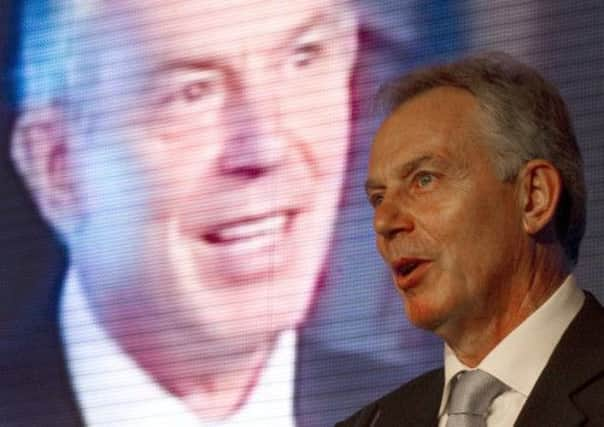Michael Fry: Tony Blair, statesman to sand dancer


After his lengthy stint at the top of global politics, we might have expected Tony Blair to become a man of profound judgments, always sure of a hearing from fellow statesmen. Such figures do exist, lingering on long after all power has fallen from their hands, to give us the benefit of their wisdom, in which personal tribulation has often been mixed with the rebirth of their societies: a Nelson Mandela; or a Mikhail Gorbachev. Political experience has moulded them not only in a practical but also in a moral sense that continues to give weight to their words.
We might have expected Blair in particular to fulfil such a role because he so obviously wants to, after being in effect forced from the British premiership in 2007 well before he himself felt he had finished with the job. On the very same day he was appointed as the representative in the Middle East of “the Quartet” – the United States, the United Nations, the European Union and Russia. It was a real tribute to the international standing he enjoyed at that point. Things have since changed.
Advertisement
Hide AdAdvertisement
Hide AdBlair has had a sort of part-time residence in Jerusalem, so his knowledge of the situation in the region comes at first hand. Presumably he has dotted around the whole time talking to this leader and that, and will have had little trouble persuading people to take his calls.
Yet it cannot be said this work has got far in the six years he has been doing it, for him or anybody else. Six years after becoming British prime minister, he had already done as much as he was ever going to do in domestic politics. In fact much of the rest of his term was spent fighting off the exertions of Gordon Brown to bring his premiership to an end.
Now six years into Blair’s operations on behalf of the Quartet, little has happened to reconcile the contending forces in the Middle East. If anything, they have moved further apart, with a hardening of attitudes among both Arabs and Israelis and no end in sight to the violence.
Meanwhile the Arab Spring has come and, perhaps, gone, or at least merged into a long, sultry summer. Blair’s initial intervention here was to advise the Egyptian people to opt for “stability”, that is, to continue submitting to the rule of Hosni Mubarak, the man whose oppression and corruption had finally driven the most educated and sophisticated of the Arab nations to open revolt. On the latest turn in that particular bit of the Spring, the army’s takeover in Cairo, Blair observed that there did not seem to be any alternative. Strange how he seemed to connect stability with tanks in the streets of hot Arab cities.
Blair has also now pronounced on Syria, urging the western powers to impose a no-fly zone over that country. This, though without involving any Nato troops in landings on the Mediterranean beaches of Latakia or Tartus, would in effect be military intervention. At the least it might entail our side shooting down the planes of president Bashar al-Assad, which would not cause many tears to flow elsewhere. Yet Russian and Iranian planes also fly into Syria: how else does Assad keep his forces supplied? Is the no-fly zone going to count for Russian and Iranian planes too? It does not look as if Blair has thought this one through either.
But then that would be all of a piece with the other interventions he has backed in the troubled Islamic world. It may be hard to recall that Britain and its allies are in their 12th year of intervention in Afghanistan. While the end is now in sight, nobody any longer pretends this is going to leave the mountains of the Hindu Kush and their ragged tribesmen in any better form than they were at the outset: once we are gone, they will just start fighting each other again instead of us. If only to arrange a reasonably dignified exit we are now trying to negotiate with the Taleban, the very force against which we first intervened. What did Blair have to say, back in 2001? “There’s no negotiating with them.”
Blair’s record of analysis and action would be poor even without his instigation of the illegal war in Iraq, which he claimed at the time to be about weapons of mass destruction but which he now justifies by Saddam’s “threat to the region”. Since all its leaders constantly fight like cats in a sack, it would be hard to say which of them was not in some sense a threat to the region
What should be clear from decades of the West’s forward-policy in the Middle East is that we are seldom able to shape events there to our liking. What we have done instead is create a permanent sense of grievance, suspicion and enmity in Arabs, or indeed generally among Muslims, that can then turn into terrorism among us, in our own lands.
Advertisement
Hide AdAdvertisement
Hide AdThere is, to be sure, no black and white in all this: the predominant colour is the red from all the blood spilled. By the same token, it is hard to argue that there has been any net benefit from western interventions. Blair, as one of the prime interventionists, has a lot to answer for. If we wanted to expand on his faults, we might say they sprang from the shallow, naive, toothy, gung-ho attitude of an ex-leader of an ex-imperial power who wishes he and it were more potent than they now are. Or we could just tell him to shut up.